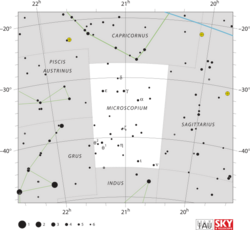Astronomy:Eta Microscopii
| Observation data Equinox J2000.0]] (ICRS) | |
|---|---|
| Constellation | Microscopium |
| Right ascension | 21h 06m 25.51950s[1] |
| Declination | −41° 23′ 09.4805″[1] |
| Apparent magnitude (V) | 5.53[2] |
| Characteristics | |
| Spectral type | K3 III[3] |
| U−B color index | +1.50[2] |
| B−V color index | +1.35[2] |
| Astrometry | |
| Radial velocity (Rv) | +22.29±0.13[1] km/s |
| Proper motion (μ) | RA: +28.760[1] mas/yr Dec.: −11.548[1] mas/yr |
| Parallax (π) | 3.5657 ± 0.1149[1] mas |
| Distance | 910 ± 30 ly (280 ± 9 pc) |
| Absolute magnitude (MV) | −1.13[4] |
| Details | |
| Mass | 1.2[5] M☉ |
| Radius | 47.41+0.95 −5.67[1] R☉ |
| Luminosity | 735±28[1] L☉ |
| Surface gravity (log g) | 1.1[5] cgs |
| Temperature | 4,365+287 −43[1] K |
| Metallicity [Fe/H] | −0.31[5] dex |
| Other designations | |
| Database references | |
| SIMBAD | data |
Eta Microscopii, Latinised as η Microscopii, is a solitary[7] star in the constellation Microscopium. It is visible to the naked eye as a dim, orange-hued star with an apparent visual magnitude of 5.53.[2] The star is located around 910 light-years distant from the Sun based on parallax, and is drifting further away with a radial velocity of +22 km/s.[1]
This is an aging giant star with a stellar classification of K3 III,[3] indicating that it has exhausted the supply of hydrogen at its core then cooled and expanded. At present it has around 47[1] times the girth of the Sun. The star is radiating 735 times the luminosity of the Sun from its swollen photosphere at an effective temperature of 4,365 K.[1]
Multiple star catalogues list two optical companions.[8] Two arc-minutes away, the 8th magnitude HD 200733 is a main sequence star much closer to Earth than η Microscopii.[9] A 14th-magnitude star one arc-minute from η Microscopii is a background object.[10]
References
- ↑ 1.00 1.01 1.02 1.03 1.04 1.05 1.06 1.07 1.08 1.09 1.10 1.11 Brown, A. G. A. (August 2018). "Gaia Data Release 2: Summary of the contents and survey properties". Astronomy & Astrophysics 616: A1. doi:10.1051/0004-6361/201833051. Bibcode: 2018A&A...616A...1G. Gaia DR2 record for this source at VizieR.
- ↑ 2.0 2.1 2.2 2.3 Drilling, J. S. (February 1973), "Photoelectric UBV photometry of late-type stars in two regions at high galactic latitude", Astronomical Journal 78: 44–46, doi:10.1086/111370, Bibcode: 1973AJ.....78...44D.
- ↑ 3.0 3.1 Houk, Nancy (1978), Michigan catalogue of two-dimensional spectral types for the HD stars, 2, Ann Arbor: Dept. of Astronomy, University of Michigan, Bibcode: 1978mcts.book.....H.
- ↑ Anderson, E.; Francis, Ch. (2012), "XHIP: An extended hipparcos compilation", Astronomy Letters 38 (5): 331, doi:10.1134/S1063773712050015, Bibcode: 2012AstL...38..331A.
- ↑ 5.0 5.1 5.2 Anders, F.; Khalatyan, A.; Chiappini, C.; Queiroz, A. B.; Santiago, B. X.; Jordi, C.; Girardi, L.; Brown, A. G. A. et al. (2019), "Photo-astrometric distances, extinctions, and astrophysical parameters for Gaia DR2 stars brighter than G = 18", Astronomy and Astrophysics 628: A94, doi:10.1051/0004-6361/201935765, Bibcode: 2019A&A...628A..94A.
- ↑ "eta Mic". SIMBAD. Centre de données astronomiques de Strasbourg. http://simbad.u-strasbg.fr/simbad/sim-basic?Ident=eta+Mic.
- ↑ Eggleton, P. P.; Tokovinin, A. A. (September 2008), "A catalogue of multiplicity among bright stellar systems", Monthly Notices of the Royal Astronomical Society 389 (2): 869–879, doi:10.1111/j.1365-2966.2008.13596.x, Bibcode: 2008MNRAS.389..869E.
- ↑ Mason, Brian D.; Wycoff, Gary L.; Hartkopf, William I.; Douglass, Geoffrey G.; Worley, Charles E. (2001), "The 2001 US Naval Observatory Double Star CD-ROM. I. The Washington Double Star Catalog", The Astronomical Journal 122 (6): 3466, doi:10.1086/323920, Bibcode: 2001AJ....122.3466M.
- ↑ Brown, A. G. A. (August 2018). "Gaia Data Release 2: Summary of the contents and survey properties". Astronomy & Astrophysics 616: A1. doi:10.1051/0004-6361/201833051. Bibcode: 2018A&A...616A...1G. Gaia DR2 record for this source at VizieR.
- ↑ Brown, A. G. A. (August 2018). "Gaia Data Release 2: Summary of the contents and survey properties". Astronomy & Astrophysics 616: A1. doi:10.1051/0004-6361/201833051. Bibcode: 2018A&A...616A...1G. Gaia DR2 record for this source at VizieR.
 |

